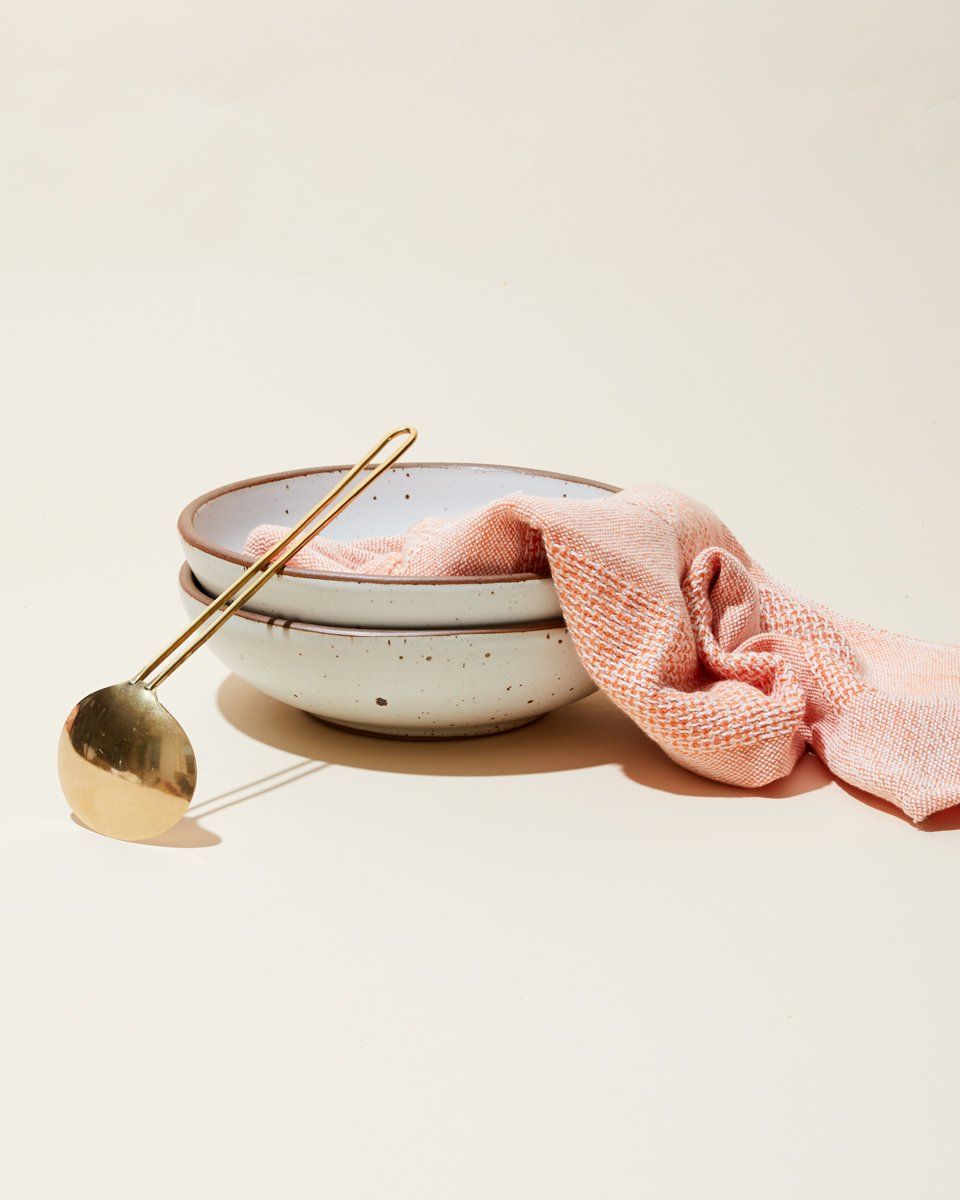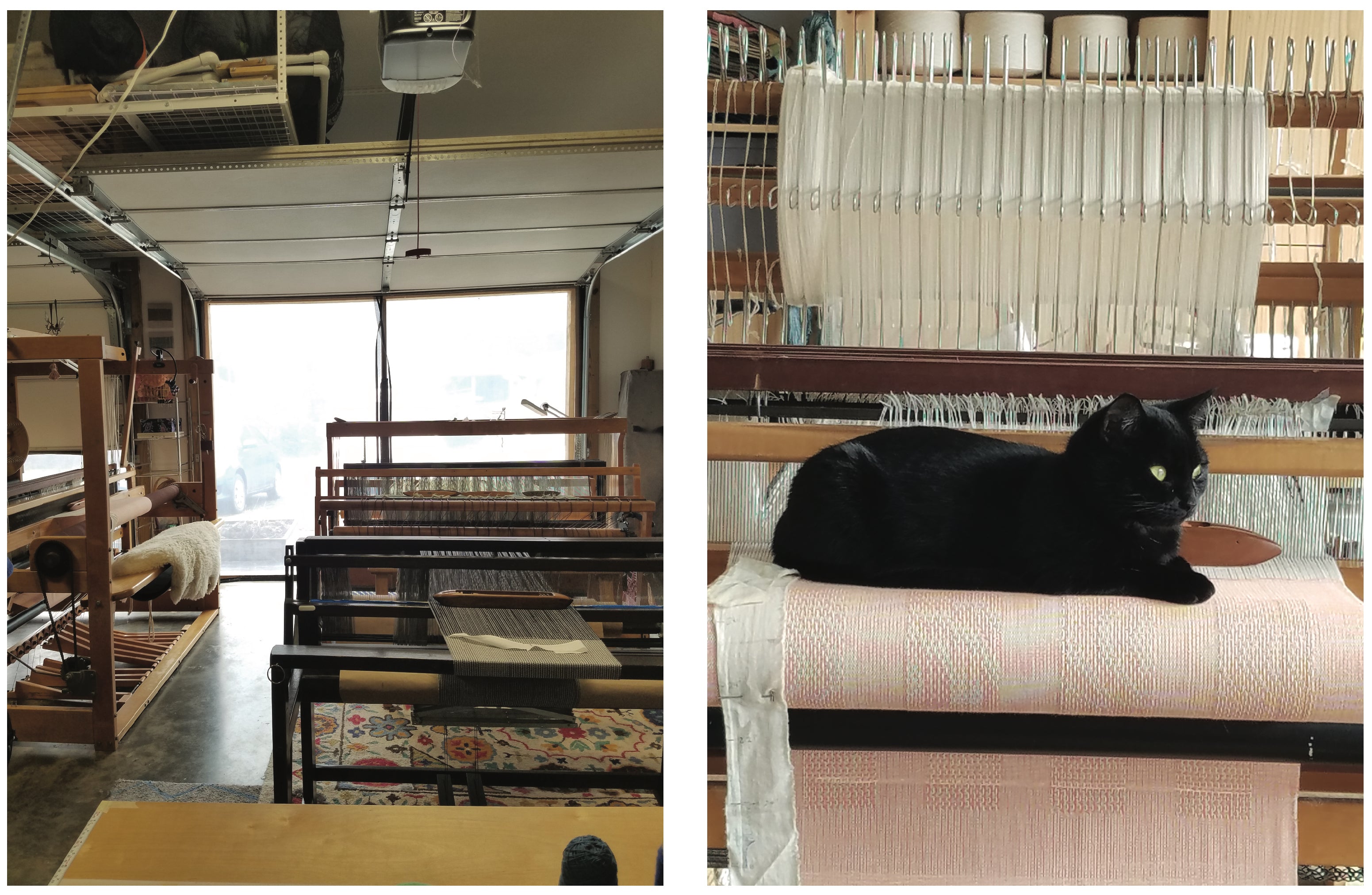
Weaving with Deanna Lynch
“I felt like I had a chance to pivot,” Deanna tells me. We’re discussing her business backstory, because Deanna has not always been a weaver. She wanted to attend art school as a teenager, but her parents felt that wasn’t a practical decision, so she studied accounting in college. It provided a reliable source of income post-graduation, but “my creative side went to sleep.”
When Deanna moved to Asheville, she saw the opportunity to do something different. She enrolled in weaving classes at Haywood Community College, and when she sat down at the loom, “I felt like I was home.” Deanna’s grandfather introduced her to weaving at a young age (he made rag rugs), and her mother's mother was an accomplished seamstress and quilter. Family history on Deanna’s father's side has traced their roots back to a broadcloth weaver in 1700s England—you could say an affinity for textiles is in the family.
 Deanna at her loom!
Deanna at her loom!
Deanna still keeps some bookkeeping clients on the side, but the majority of her time is now spent weaving in her home studio on one of her four looms. She makes everything from picnic blankets to market bags to scarves and tops, all of which you can find on her web shop. Deanna relies mainly on commercially-dyed fibers in her work. And while she’s done natural dyeing in the past, it’s a finicky process that can produce wildly different end results (not ideal when you’re production-style making 100 of the same item).
Funnily, it took going all the way to New York for Deanna and the East Fork crew to get connected. Connie and Erin Hawley (East Fork’s CMO and Senior Brand Manager, respectively) were at New York Now and saw wholesale work Deanna made for Virginia Sin. Intrigued, they learned the weaver was local to Asheville and went straight to the source! Deanna’s work has had a home at East Fork ever since.

A glimpse into Deanna's studio and a very cute cat to keep her company!
Deanna doesn’t think of herself as an artist—her work is much more production style. We laugh as we acknowledge that this type of work can be repetitive. “Not everyone is cut out for production work,” said Deanna, “but if you like the making enough, you’ll make anything.” For Deanna, weaving allows her to reach a meditative state, and she finds it grounding to drop into the idea that whatever piece she’s working on is going to someone’s home.
“I don’t like to make wastefully,” Deanna tells me, and I understand. Just because we can make our own clothes, or dish towels, or mugs, doesn’t always mean we need more of the thing. We’re talking about our grandparents again, and how function and need drove so much of the making process. ("Bless Deanna," I think this was the point in our video call where I ran to get a bunch of vintage textiles to show her and she just rolled with it.)
 Deanna's weaving up-close.
Deanna's weaving up-close.
“I wish hemp was getting more attention,” Deanna answered, when I asked her if she feels like she has a product that’s overlooked. Hemp fiber is much more environmentally friendly than cotton (and antimicrobial), but the hemp fiber world is fairly new and lacks regulation in production, resulting in an inconsistent product. Deanna tells me she’s wondered about using the waste product from cannabidiol (CBD) production to make hemp fibers—if this takes off, you heard it here first!
I asked Deanna about other weavers in the area, as I admittedly don’t know much about the Asheville weaving scene. There are other production weavers, like Deanna, but many operate without websites and are a bit more old-school. Deanna said she’s noticed that many young weavers focus on selling the story and “trying to make weaving more esoteric,” curating very specific and branded stories around their weaving. Deanna laughs and wonders if maybe she should be doing more of that, but “I don’t want people to feel like my work is too precious to use.”
I laugh too, because I would 100% be the “esoteric” type of weaver. I tend to overly drive home the point, wanting to earnestly explain why a thing is beautiful, or special, or important, not trusting that folks will arrive at that conclusion independently. I’m tempted to do that here as I wrap this up, because textile metaphors are a great way to make a lot of sappy statements about life. I want to end on some big note about “threads of our lives” and “weave” this whole piece together into some “tightly knit” (see?!) conclusion, connecting Deanna’s work and our conversation to the ancient art of weaving and the dawn of time.
 Our Handwoven Tea Towel in Tequila Sunrise being made!
Our Handwoven Tea Towel in Tequila Sunrise being made!
But, in addition to being unnecessary, I think ending on some overly contrived note is a disservice to Deanna’s pragmatic approach to her work (which was one of my favorite things about our conversation). A Deanna Lynch kitchen towel, purchased from East Fork, gets the job done and is beautiful. It doesn’t need to be any more complicated than that.
You can find Deanna’s work on her website, with us at East Fork, and at the Grovewood Gallery, Asheville Hemp Farm, and the Troika Gallery in Floyd, Virginia. In addition, WNC residents can take classes from Deanna, from mending 101 to mini quilt making.
 Deanna at her loom!
Deanna at her loom!
 Deanna's weaving up-close.
Deanna's weaving up-close. Our Handwoven Tea Towel in Tequila Sunrise being made!
Our Handwoven Tea Towel in Tequila Sunrise being made!